Find out how familiar biblical figures were also radical revolutionaries, challenging the status quo and sparking enduring change.
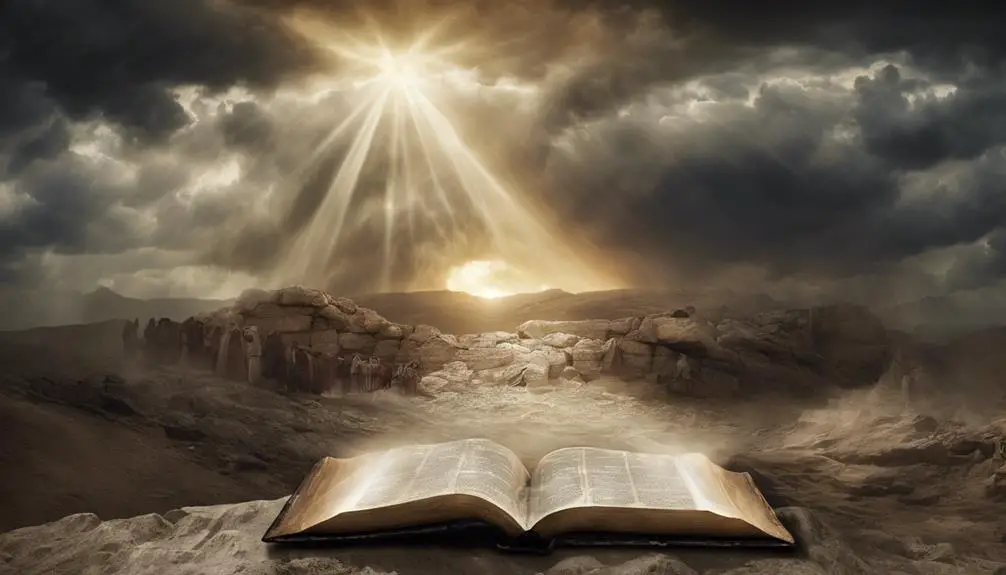
Revolutionaries in the Bible
Contrary to popular belief, the Bible isn't just a book of rules and prophecies; it's also a record of radical revolutionaries. You may see religious figures like Moses, Esther, Samson, Daniel, and Paul as pious individuals, but peel back the layers and you'll find they were also social and spiritual trailblazers.
These characters didn't just follow the status quo, they challenged it, sparking change and leaving lasting impacts. But how exactly were they revolutionary, and what can their examples teach us today? Let's take a closer look, and perhaps you'll find some unexpected inspiration.
Key Takeaways
- Biblical figures like Moses, Esther, Samson, Daniel, and Paul revolutionized history with their courageous leadership, advocacy, divine strength, faithful courage, and transformational faith.
- Their stories illustrate how faith and conviction can lead to radical societal and personal transformations.
- The Bible portrays these revolutionaries as individuals who challenged the status quo, risking their lives and positions for the greater good.
- Their legacies continue to inspire and shape the course of history, offering valuable lessons on leadership, courage, redemption, and spiritual transformation.
Moses: The Liberator
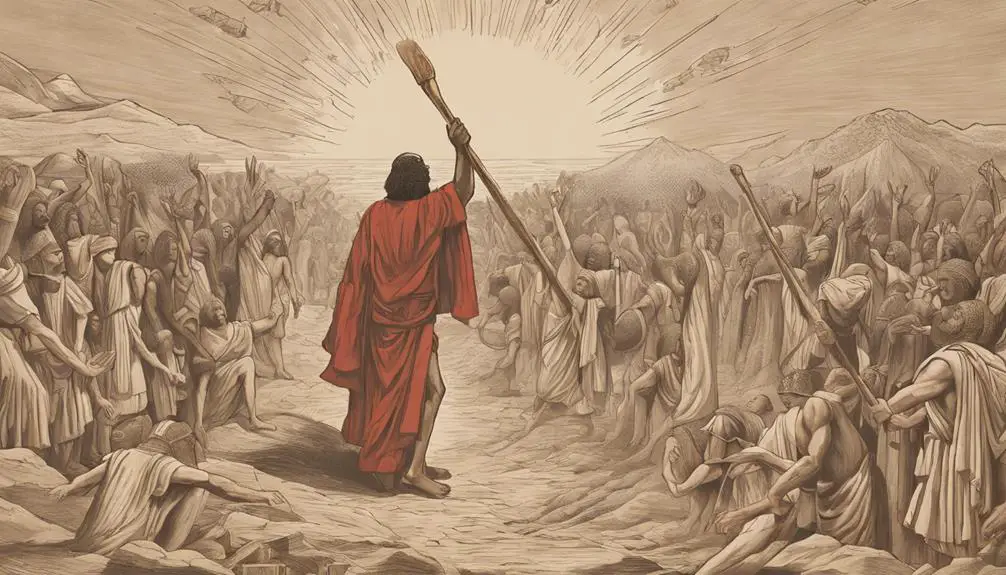
Often hailed as one of the most influential revolutionaries in the Bible, Moses played a pivotal role as a liberator, leading the Israelites out of Egyptian bondage. You can't overlook his unique leadership style, which was a blend of firmness and humility. It was this style that won him the loyalty and trust of his people.
Now, let's delve into the Liberation Theology in Exodus. This theological perspective views Moses' act of freeing the Israelites as a divine mandate for social and political liberation. It's a notion that resonates with oppressed communities even today, underscoring the relevance of Moses' leadership.
Still, you've got to appreciate the challenges Moses faced. He was dealing with a dictator in Pharaoh and a dispirited people in the Israelites. It's a testament to his effective leadership that he managed to navigate through these obstacles. His leadership wasn't just about winning battles; it was about restoring hope and faith.
In analyzing Moses' role as a liberator, you should note his conviction, resilience, and his willingness to act against oppression. These qualities embody his leadership style, and they're integral to understanding the Liberation Theology in Exodus.
Esther: Advocate for Her People
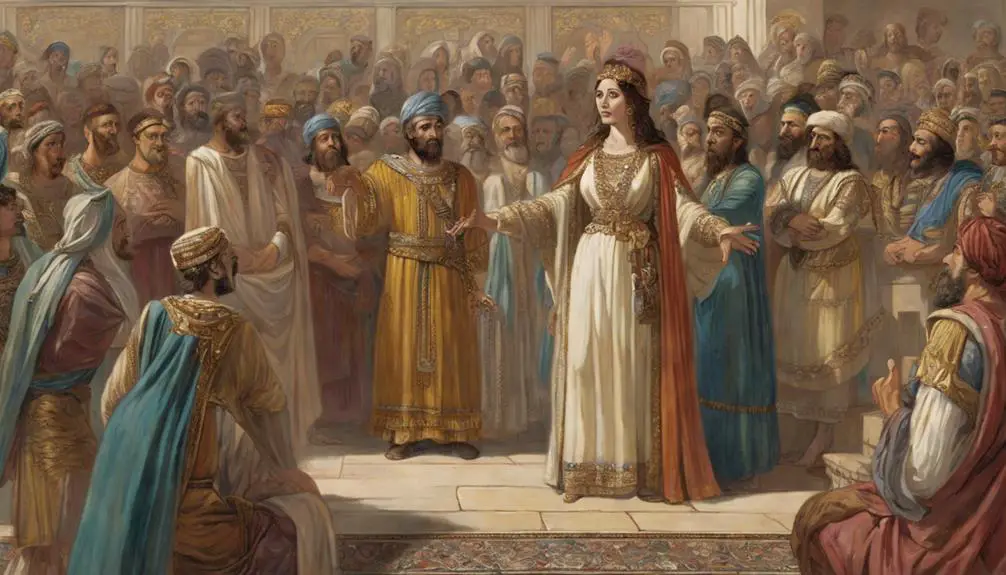
Turning our attention from Moses' leadership, another figure who used her influence for the liberation of her people is Esther, a courageous woman whose advocacy played a crucial role in the survival of the Jewish people. Esther's courage and Jewish advocacy are key elements in her story.
- Esther's Courage: Esther's bravery shines brightly in the narrative. She risked her life by approaching the king unsummoned, a crime punishable by death. But she didn't let fear dictate her actions, clearly exhibiting her courage.
- Jewish Advocacy: Esther didn't just save herself, but she used her position to advocate for the Jewish people. She revealed her Jewish identity to the king, pleading for the lives of her people.
- Influence: Esther's influence was paramount. She leveraged her position as queen to change the fate of an entire nation.
- Legacy: Esther's legacy continues to inspire many. Her story is a testament to the power of courage and advocacy, shaping the course of history.
Samson: The Unconventional Hero
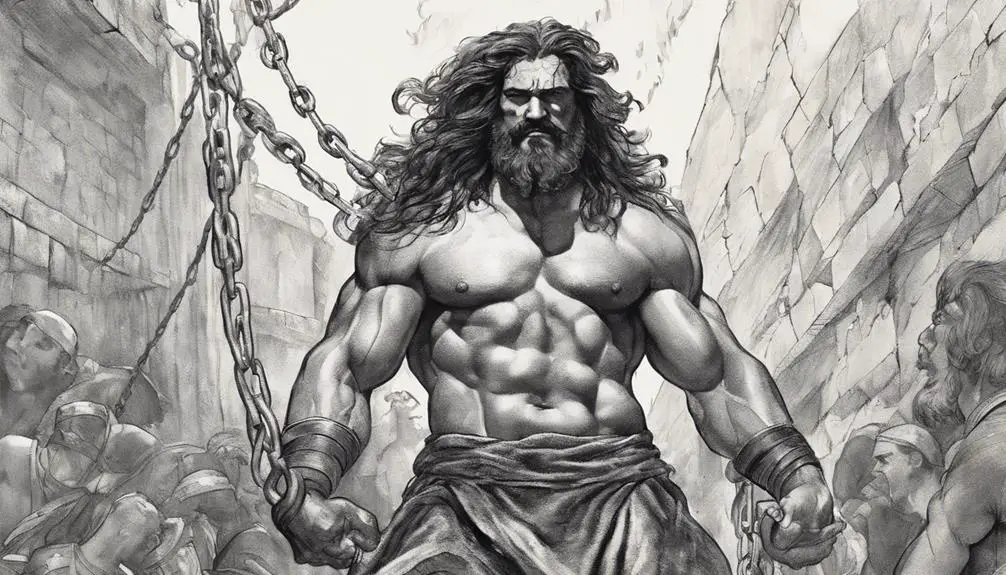
Shifting our focus, we now examine Samson, an unconventional hero whose strength and downfall present a compelling narrative of power, temptation, and redemption in the Bible. Samson's strength, as you may recall, wasn't an inherent quality but a divine gift linked to his Nazirite vow.
Samson's Story |
Description |
|---|---|
Samson's Strength |
His superhuman strength was a divine gift, not inherent. |
Nazirite Vow |
Samson's power was tied to his adherence to the Nazirite vow, particularly his uncut hair. |
Downfall and Redemption |
Samson's downfall came when he broke his vow. His redemption occurred when his strength was restored for one final act of heroism. |
You'll notice that Samson's strength was both his greatest asset and his Achilles heel. He used it to defeat his enemies but it also made him a target. His Nazirite vow, specifically the uncut hair, became a symbol of his power and, eventually, his downfall. Delilah's betrayal led him to break his vow, resulting in his capture and blindness. Yet, in his final act, Samson's strength returned, allowing him to bring down the Philistine temple, proving his redemption. Samson's life, thus, presents a complex narrative of power, temptation, and redemption.
Daniel: Boundary Breaker
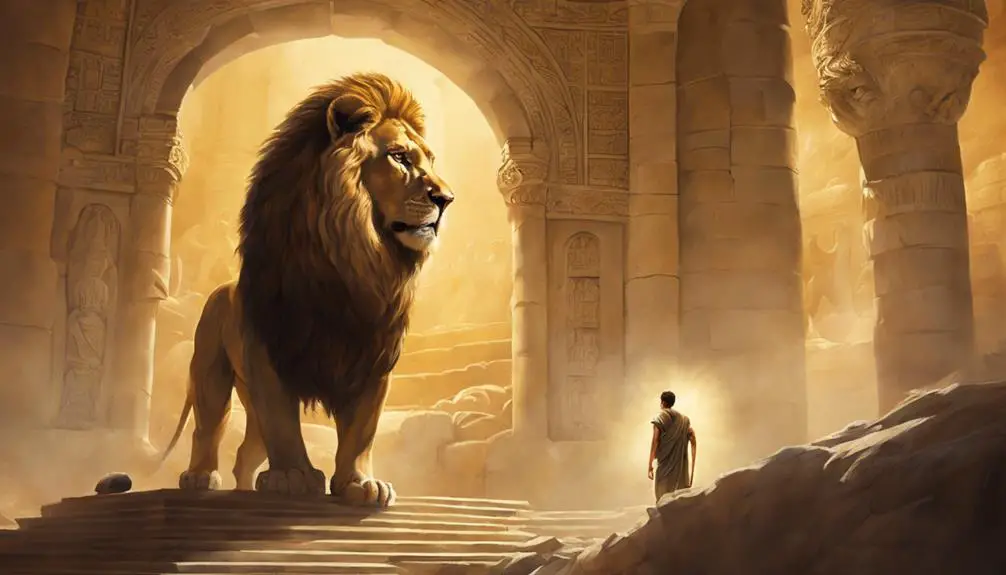
Delving into Daniel's narrative, you'll discover a boundary breaker who navigates through a foreign kingdom, maintaining his faith while serving in a pagan court. His story is a testament to unwavering faith and courage in the face of adversity.
Daniel's life can be dissected into four key themes:
- Faithfulness: Despite being a captive in Babylon, Daniel remained faithful to God.
- Wisdom: He was known for his wisdom and ability to interpret dreams, particularly evident in 'Daniel's Dreams Interpretation'.
- Courage: Daniel's 'Lion's Den Survival' showcases his courage. He was thrown into a den of lions for disobeying a royal decree, yet his faith kept him safe.
- Influence: Daniel rose to a position of influence, serving multiple kings and impacting an entire kingdom.
Daniel's life is a profound example of how faith can break boundaries. Despite being in a foreign land and serving foreign rulers, he didn't compromise his faith. His wisdom, especially his ability to interpret dreams, set him apart. His courage in the lions' den is another testament to his boundary-breaking faith.
As you continue to explore the revolutionaries in the Bible, remember Daniel's faith and courage that shattered barriers.
Paul: The Radical Convert
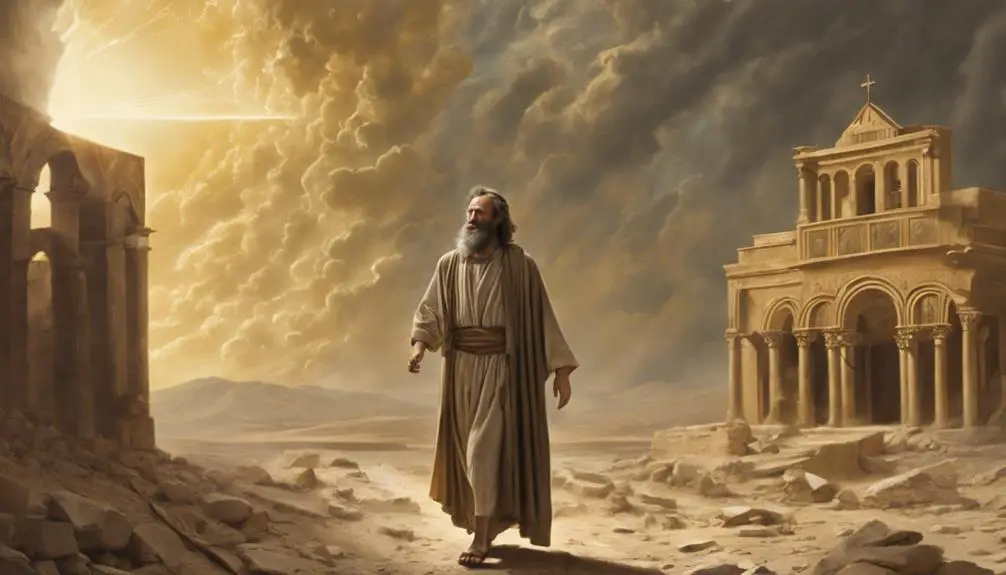
Just as Daniel's faith shattered barriers in Babylon, Paul's radical conversion on the road to Damascus challenges our understanding of spiritual transformation. From a zealous persecutor of early Christians to one of the most influential apostles, Paul's transformation is nothing short of revolutionary.
Paul's encounter with the risen Christ on the way to Damascus was a turning point. You see, spiritual transformation isn't just a change of mind or heart. It's a complete turnaround, a 180-degree shift, as demonstrated by Paul. His life radically changed course, compelling him to spread the teachings of Christ across vast stretches of the Roman Empire.
Paul's transformation wasn't a mere personal journey. It had far-reaching effects on the spread of Christianity. His missionary journeys, letters, and teachings played a pivotal role in establishing Christian communities, shaping Christian theology, and spreading the faith beyond Jewish communities to Gentiles.
Paul's radical conversion and subsequent life underscore the transformative power of faith. His story challenges us to rethink our understanding of spiritual transformation. It's not just about personal growth but about impacting the world around us, just as Paul did in the spread of Christianity.
Frequently Asked Questions
How Did the Cultural Context Influence the Actions of These Biblical Revolutionaries?
Cultural context greatly shapes revolutionary motivations. It's the backdrop that influences how you react and rebel.
Just as in any time or place, the society, norms, and values of the period directly impacted the decisions and actions of the individuals. In your case, it determined how they challenged the status quo, risking everything to bring about change.
Their cultural context ignited their biblical rebellion, guiding their revolutionary path.
Were There Any Other Significant Figures Who Played a Revolutionary Role in the Bible That Are Not Discussed in This Article?
Indeed, there are other significant figures not discussed in the article who played revolutionary roles in the Bible.
Take Moses, for example, his revolutionary motivations led him to challenge Pharaoh and liberate the Israelites from slavery, a clear act of biblical rebellion.
Or consider Deborah, a judge and prophetess who led Israel to victory over its oppressors.
Their actions significantly shaped the course of biblical history.
How Did the Actions of These Individuals Impact the Political Landscape of Their Times?
You're keen to understand how revolutionary actions can reshape the political landscape.
Imagine this: Revolutionary motivations lead to significant shifts, just as Biblical insurgencies did. These individuals' actions sparked change, challenged the status quo, and often sparked political upheaval.
Their actions didn't merely ripple through their era's politics; they created waves that continue to influence political thought and action today.
Are the Revolutionary Actions of These Biblical Figures Viewed Differently in Other Religious Texts or Interpretations?
Yes, comparative scriptural analysis often reveals differing perspectives on revolutionary actions. In some religious texts, these figures' actions symbolize defiance or social change, while in others, they may represent divine intervention or spiritual awakening.
It's crucial to understand that interpretations can vary widely, depending on cultural context, religious beliefs, and theological interpretations.
How Has the Legacy of These Biblical Revolutionaries Influenced Modern Religious Practices and Beliefs?
You're seeing how the legacy of these revolutionaries deeply shapes modern beliefs and practices. Their revolutionary influence on secular ethics has been profound, impacting societal norms and values.
Additionally, these figures are often depicted in arts and media, further shaping perceptions. It's clear their influence extends beyond just religious texts, playing a significant role in the development of contemporary culture and thought.
Conclusion
You've explored some of the Bible's most notable revolutionaries:
- Moses, the liberator,
- Esther, the advocate,
- Samson, the unconventional hero, and
- Daniel, the boundary breaker.
You've also seen Paul's radical conversion. Each character initiated change in their own unique ways, challenging norms and sparking revolution.
This exploration can help you see the Bible in a new light, highlighting the transformative power of faith and the revolutionary spirit that often lies at the heart of biblical narratives.

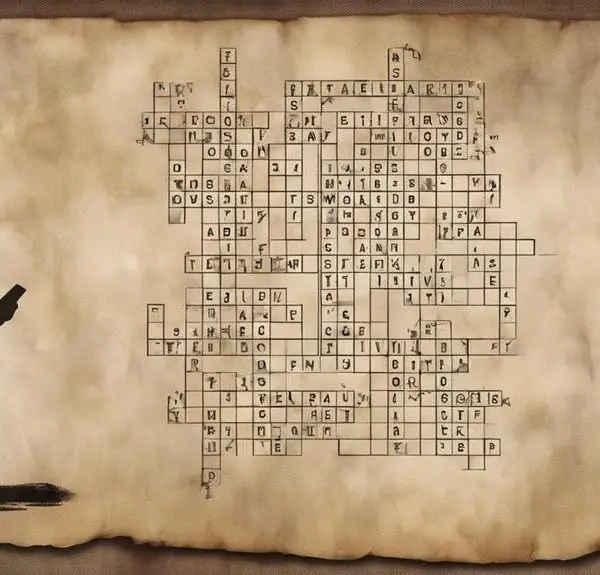

Sign up